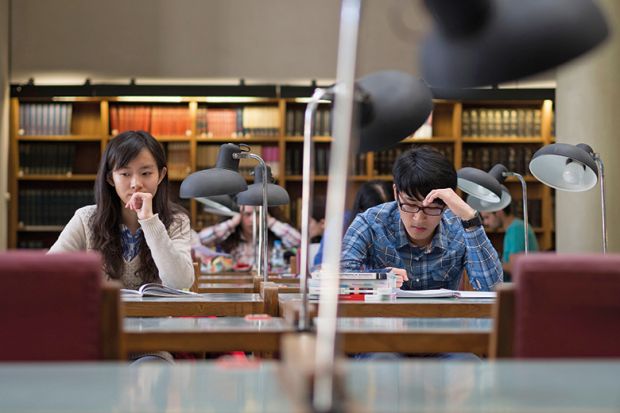Chinese students at UK universities are more likely to suffer from severe psychological distress than their counterparts at institutions in China, according to the preliminary findings from a major study.
A new survey found that 16 per cent of Chinese international students in the UK show signs of “severe distress” – meaning that they have depressive symptoms most or all of the time – compared with 10 per cent of Chinese students at home.
Just over a fifth of Chinese students in the UK (21 per cent) feel distressed some of the time, compared with 17 per cent of Chinese domestic students.
However, the study found that there was little difference in the distress levels between UK-based Chinese students and UK domestic students; 38 per cent of UK home students show signs of moderate or severe distress, compared with 37 per cent of Chinese students in the country.
The findings are the first results from a new collaborative study in the UK, China and Germany investigating East Asian student mobility. It is the first such study that is based on a representative sample survey of Chinese international students in the UK.
These results, which were presented at the annual conference of the UK Council for International Student Affairs, were based on a survey of 5,610 undergraduate and postgraduate students in the UK and China, who were asked to identify how often they had felt six different distress symptoms in the past 30 days.
About a fifth of Chinese students in the UK said that they felt nervous (20 per cent) or restless and fidgety (22 per cent) most or all of the time, compared with about one in 10 of their peers in China (10 per cent and 12 per cent, respectively).
The authors of the study said that the findings could reflect the fact that the most stressful period of education in China is that leading up to and during the gao kao – the university entrance exam – meaning that, by contrast, university itself in China is not as stressful.
They also noted that master’s degrees in China typically last three years, in comparison to one year in the UK.
Sophia Woodman, chancellor’s fellow in the School of Social and Political Science at the University of Edinburgh and co-investigator of the project, said that “the structure of the degree” is “very different” in the two countries.
“Typically, university degrees in China are four years, and in the fourth year students hardly have any courses. They are expected to be writing a dissertation and looking for jobs,” she said.
Dr Woodman added that the degree classification system in the UK “means that how you do in your degree matters”, whereas in China “it’s about what university you get into”.
Register to continue
Why register?
- Registration is free and only takes a moment
- Once registered, you can read 3 articles a month
- Sign up for our newsletter
Subscribe
Or subscribe for unlimited access to:
- Unlimited access to news, views, insights & reviews
- Digital editions
- Digital access to THE’s university and college rankings analysis
Already registered or a current subscriber? Login








